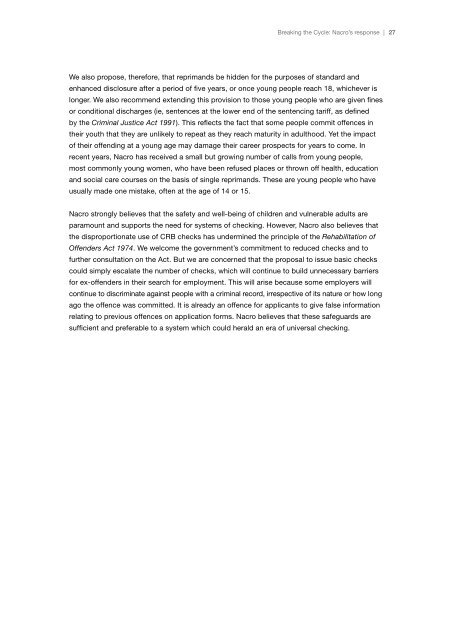Nacro's response to Breaking the Cycle Green Paper
Nacro's response to Breaking the Cycle Green Paper
Nacro's response to Breaking the Cycle Green Paper
Create successful ePaper yourself
Turn your PDF publications into a flip-book with our unique Google optimized e-Paper software.
<strong>Breaking</strong> <strong>the</strong> <strong>Cycle</strong>: Nacro’s <strong>response</strong> | 27We also propose, <strong>the</strong>refore, that reprimands be hidden for <strong>the</strong> purposes of standard andenhanced disclosure after a period of five years, or once young people reach 18, whichever islonger. We also recommend extending this provision <strong>to</strong> those young people who are given finesor conditional discharges (ie, sentences at <strong>the</strong> lower end of <strong>the</strong> sentencing tariff, as definedby <strong>the</strong> Criminal Justice Act 1991). This reflects <strong>the</strong> fact that some people commit offences in<strong>the</strong>ir youth that <strong>the</strong>y are unlikely <strong>to</strong> repeat as <strong>the</strong>y reach maturity in adulthood. Yet <strong>the</strong> impac<strong>to</strong>f <strong>the</strong>ir offending at a young age may damage <strong>the</strong>ir career prospects for years <strong>to</strong> come. Inrecent years, Nacro has received a small but growing number of calls from young people,most commonly young women, who have been refused places or thrown off health, educationand social care courses on <strong>the</strong> basis of single reprimands. These are young people who haveusually made one mistake, often at <strong>the</strong> age of 14 or 15.Nacro strongly believes that <strong>the</strong> safety and well-being of children and vulnerable adults areparamount and supports <strong>the</strong> need for systems of checking. However, Nacro also believes that<strong>the</strong> disproportionate use of CRB checks has undermined <strong>the</strong> principle of <strong>the</strong> Rehabilitation ofOffenders Act 1974. We welcome <strong>the</strong> government’s commitment <strong>to</strong> reduced checks and <strong>to</strong>fur<strong>the</strong>r consultation on <strong>the</strong> Act. But we are concerned that <strong>the</strong> proposal <strong>to</strong> issue basic checkscould simply escalate <strong>the</strong> number of checks, which will continue <strong>to</strong> build unnecessary barriersfor ex-offenders in <strong>the</strong>ir search for employment. This will arise because some employers willcontinue <strong>to</strong> discriminate against people with a criminal record, irrespective of its nature or how longago <strong>the</strong> offence was committed. It is already an offence for applicants <strong>to</strong> give false informationrelating <strong>to</strong> previous offences on application forms. Nacro believes that <strong>the</strong>se safeguards aresufficient and preferable <strong>to</strong> a system which could herald an era of universal checking.
















